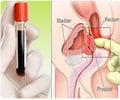Researchers have found that low-fat diet with fish oil supplements slow down the growth of prostate cancer.

They had increased levels of omega-3 fatty acids from fish oil and decreased levels of omega-6 fatty acids from corn oil in the cell membranes, which may directly affect the biology of the cells, though further studies are needed, said Dr. William Aronson, the study's first author and a researcher with UCLA's Jonsson Comprehensive Cancer Center.
The study also found that blood obtained from patients after the low-fat, fish oil diet program slowed the growth of prostate cancer cells in a test tube as compared to blood from men on the Western diet, which did not slow cancer growth.
"The finding that the low-fat, fish oil diet reduced the number of rapidly dividing cells in the prostate cancer tissue is important because the rate at which the cells are dividing can be predictive of future cancer progression," Aronson said.
"The lower the rate of proliferation, the lesser the chances that the cancer will spread outside the prostate, where it is much harder to treat."
Aronson said the study using human blood and tissue also proved that the changes prompted by what the men were eating were clearly evident in their prostate tissue - the "treatment" was indeed reaching the targeted organ because of the changes in the prostate cell membrane's fatty acid composition.
Advertisement
The low-fat diet consisted of 15 percent of calories from fat. Additionally, the men on this diet took five grams of fish oil per day in five capsules, three with breakfast and two with dinner, to provide fish oil omega-3 fatty acids. Omega-3 fatty acids have been found to reduce the incidence of heart disease and fight inflammation, and inflammation has been associated with certain cancers.
Advertisement
Source-ANI















